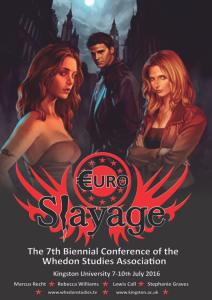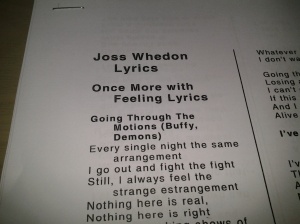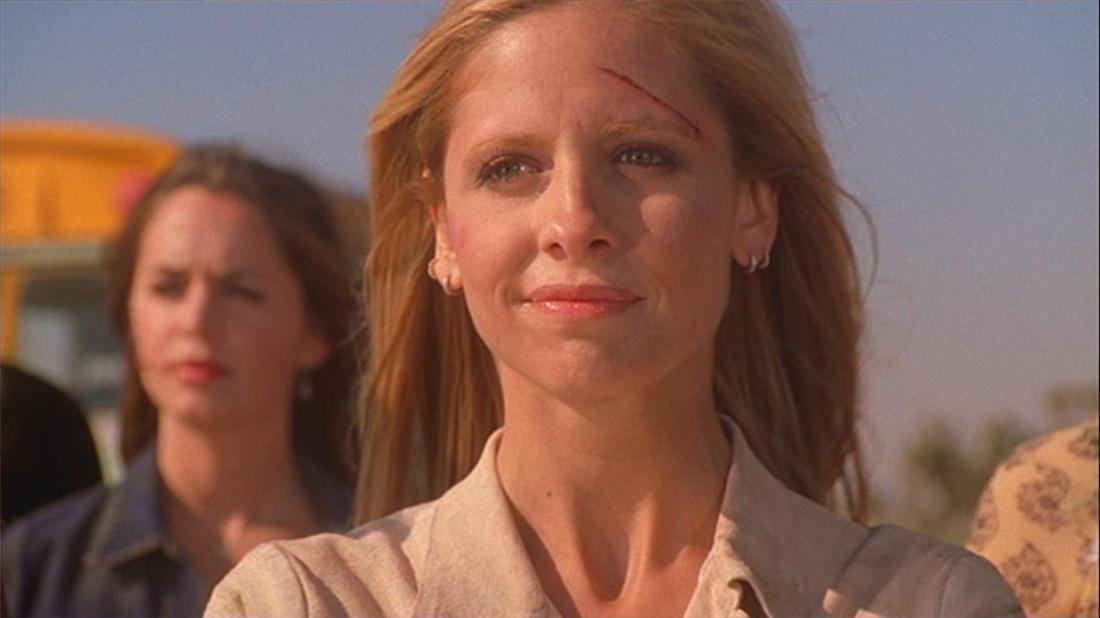Think of a weekend away to celebrate and examine the works of Joss Whedon, the genius who created Buffy the Vampire Slayer, and who wrote & directed Marvel’s Avengers (Assemble) and Age of Ultron, and you’d be forgiven for thinking about a convention. That was the reaction I had from several people when telling them I would be attending EuroSlayage, but it instead was something rather different (and I would argue a whole lot more) than this.

Organised by the Whedon Studies Association, the seventh biennial Slayage was an academic conference; an oppurtunity for teachers, scholars, and researchers to come together to present and discuss ideas from across a wide range of the Whedonverses, or to utilise ideas and characters present in them as an example of wider arguments.
Although primarily a gathering of those active within academia itself, there were also a number of passionate fans of Whedon’s work who had attended essentially for their own enjoyment. Having studied for both a Bachelor and Master of Arts in the realm of Film and Television Studies, although having finished the latter four years ago, I was somewhere between the two.
Regardless of background however, it seems as though talking with friends, family, and colleagues, was met with the same kind of misunderstanding. “You’re studying Buffy?” is a question often posed to academics by those from other disciplines, whereas “you’re studying Buffy?” is one posed by those outside of academia. Thus EuroSlayage was made up of fans and academics (although I argue that both labels would apply to all at the conference, regardless) who not only recognise the value of studying such topics, but who were also delighted to be in the company of those who understand the struggle of dealing with others who consider it ‘just’ a TV show. There was even one presentation which dealt specifically with this issue.
As this was my first Slayage (primarily as it was the first to be held outside of North America, and as such much attention was paid to Whedon’s use of Englishisms), and my first academic conference at all, I was told on several occasions that it was not to be taken as an example of academic conferences in general. My first thought upon hearing this was to feel sorry for the rest of academia…
Having booked my train to the wrong station (I was so excited about securing my place at the event in Kingston that I failed to notice I was actually staying in the neighbouring London borough of Surbiton), my Slayage began by turning up to register at the Knight’s Park Campus, followed by taking my travelling backpack to the Seething Wells halls on what can only be described as an urban hike (it is a rather big backpack), and then the journey back again.
I arrived at the wine reception shindig to see a room full of people all chatting away as if they had known each other for years, and at this point realised that many of them indeed had, and that I had no idea as to how I would join in. Luckily I arrived just before the welcome by WSA President Stacey Abbot, and Associate Professor at Kingston University Simon Brown. As much as I enjoyed their introduction, I have to say nothing was as welcome as the whole sea of hands raised at the question of “who here is attending their first Slayage”. I was far from alone.
And far less alone that I originally thought, as people soon came up to me to introduce themselves, thankfully negating the fact doing this for myself is not one of my strong points. Although I didn’t recognise any faces, I have to admit that there was a great thrill at having Rhonda Wilcox, the author of Why Buffy Matters, a seminal Buffy textbook, say hello and that she recognised my name. Admittedly just from the list of those registered to attend, but still.
This was matched by having a short but sweet conversation with a lovely lady taking photos, about whether she wanted us to pose or if she would prefer us to act natural. She then introduced herself as Mary Alice Money, someone who Wilcox often quotes and defers to in her book, essentially becoming analogous to a grand sire of mine in terms of Buffy studies. Whoever came up with the idea of never meeting your idols because you’ll only be disappointed obviously never attended a Slayage.

This was also another situation in which geeky T-shirts should never be underestimated, as they made a great ice breaker for many more than just myself. After the formal event ended, this lead to going to dinner with two women I had never met before, from entirely different countries to my own, but who I was chatting with as though I had known for years.
The next morning the conference began in earnest, with three full days (9am – 7pm) of talks, presentations, and four flights of stairs to get to them. I personally couldn’t have asked for a better start, with a keynote speech about fan reactions to the endings of TV series, and the ways in which those series continue, something which I find particularly interesting. After this came something completely different, but which I was equally looking forward to.
Although Joss Whedon is undoubtedly the current writer/producer/director whose work has the most analytical scholarship about his works, the first talk of the day (or at least my first, the nature of parallel sessions meaning I couldn’t attend them all) was entitled “Images of Tea in the Whedonverse“, something I had never begun to consider before, and was curious as to what I would learn.
In fact it turns out that tea is a perfect example of how even something that a first seems like the most inconsequential element will have many layers of meaning that you only realise after they have been explained to you, but which you can’t unsee afterwards. As well as conforming to English stereotypes, tea – of the British/European variety – was used to highlight the idea of the friendship group; both Wesley’s tea set and Fred’s mug being the first and most obvious possessions seen to be packed away after their respective leavings of the core group in Angel.
Chinese tea meanwhile, and the rituals surrounding it, is also often used as a representation of invitations, particularly those of an intimate or sexual nature. Upon watching Firefly when I returned home I noticed that the introduction of companion (read: courtesan) Inara saw her entertaining a client – both in the physical and ‘smile and nod’ sense – only to be insulted by an insinuation of cheating him of both time and money. With the mood obviously ruined, her reaction is to discard the tea set she had been carrying for seemingly no other reason that to discard it. As I said, cannot be unseen.
Other talks throughout the conference ranged from such a wide variety of approaches and disciplines that it is impossible to list them all here, although the full schedule can be found on the conference’s website. Whilst some may be fairly obvious in terms of tracing the links to classical literature (comparing Serenity‘s Operative to Les Misérables‘ Javert), or looking at the influences and contrasts of ancient mythology (the reversal of the Greek Orpheus myth, with heroine rescuing the male from hell), others took more outside the box approaches to Whedon’s work. There were also those which looked at Whedon himself, with one such talk examining at how fans (and indeed anti-fans) react to his own politics and charity work.
There was so much on offer to take in, and as much as I can only congratulate the organisers for the entire weekend, I cannot blame those who chose not to attend every session, particularly those directly before or after their own presentations. While it was impossible to attend every single panel due to them running parallel with each other, all those I did attend were fascinating, although perhaps last thing on a second full day wasn’t the best time slot for an examination of Buddhist philosophical concepts about self/no self regardless of any relation to Dollhouse? It’s fair to say that wasn’t when my mind was at its sharpest, but then I highly doubt I would have understood it all anyway. Perhaps at least this way I have a reasonable excuse?

Luckily the first day was followed by an evening meal which, presumably like other conferences, allowed the attendees to continue meeting new people and continue many discussions. There was also a raffle in which a number of text books were given away as prizes, of which I myself was a lucky winner, and now that my brain has been given a rest I can actually sit down and read. There was also a handing out of lyric sheets for the Buffy Sing-a-long, although I have been lead to believe this is not a standard occurrence at other conferences. As I mentioned before, the rest of academia has my sympathies.
In fact the only downside to such an evening was following a group who were walking back to what myself and one of many newly made friends originally thought was where we were staying, but who turn into the car park of a B&B and say good night. I can only thank them for not minding us tagging along in the first place, add London to the list of cities in which I’ve gotten lost, and figure that hey, part of the reason I attended Slayage was to learn, right? And what better way to learn than from your mistakes?
But whilst I wholeheartedly endorse this type of behaviour (by which I mean the merriment, although getting lost can have its merits), it is important to note that the conference wasn’t one to shy away from the more serious topics either.
Several presenters at Slayage raised many valid points which often came to the same conclusion about how Buffy, and pop-culture in general, help frame society’s values. One talk focused on how ideas of/reactions to abortion and sterility have been represented in the Whedon’s works, and the now infamous attempted rape scene in “Seeing Red” was mentioned several times in relation to notions of ‘masculinity’, as well as actual audience reactions to the very real world concepts of consent and abusive relationships. These also lead to discussions as to why other attempted rapes (as seen in “The Pack”), and telefantastical rape analogies (“Tabula Rasa”) were often overlooked. Ideas which were summed up expertly at one of the last talks of the entire conference, in which “The Wish” in particular was examined in terms of upholding and continuing the trend of victim blaming.
Likewise, two other talks as part of the same panel were the start of an audience debate in terms of attitudes towards of the deaths of women of colour. Although each talk was looking at the death of a particular slayer as examinations of the vampires who kill them rather than the slayers themselves, the point was rightly raised that at the very least in terms of how arguments are phrased, more awareness needs to be highlighted in terms of both gender (slayers are always female), and race (Kendra and Nikki are both black).
Discussions such as these raised the quality of Slayage as not only are they those which have to be had, but despite the obvious passion with which people were making their argument, they were also done so professionally and in a constructive manner. “Xander’s a dick!” is another point which was brought up with regards to a central male character who is often considered to be the heart of Buffy‘s Scooby Gang (see “Primeval”/”Restless” in particular), but whose other actions throughout the series also include slut-shaming the female lead.
That’s not to say that the entire conference was dominated by such seriousness, as analysis of the varying ways post-coital “morning after” scenes depict specific relationships elicited the giggles you can’t help but expect from such a topic. This is to say nothing of the way in which a room of fully grown academics reacted to the image of Anya eating chocolate whilst unashamedly staring at Spike’s masculine (à la Bruce Lee) body. More than this though, the friendly nature of the conference as a whole meant that presentations were given in a relaxed and even jovial atmosphere.
All of which added up to something one of the earliest professors of my BA once said; subjects like Film and TV aren’t easier than any other, we just have more fun while we’re studying them. Something I can attest to personally as I thoroughly enjoyed my own studies, and attended Slayage having still followed the work of the WSA throughout the four years since I was last within academia. Going back to study for a PhD is also something I have always considered as a possibility for the future.
Despite being hectic at times, and with far more to take in (not to mention write down by hand) than anything else I’ve experienced in such a long time, Slayage has left me with that bittersweet feeling of being sad that it is now over and I have to go on living in the real world once more (apparently it’s the hardest thing), but also glad at having experienced something which, either despite or because of current events, chose to “live as though the world is as it should be, to show it what it can be”.
So.
What am I gonna do now?

Great write up, Ian! I hope we can catch up at the next Slayage wherever it may be.
LikeLike